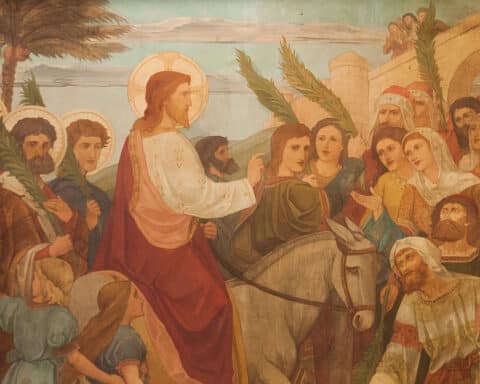Catholicism is a faith that sees the gift of institutions. We open up Catholic schools for the education of children and seminaries for the formation of priests. We develop parish programs and processes for evangelization and catechesis. We engage with the state, advocating for the institution of the common good throughout society.
Such institutional trust, though, must be balanced by an accompanying wariness. The institutions that we found, the programs and processes that we develop, even the states will not exist forever.
In the closing weeks of Ordinary Time, the Church turns her attention to the final judgment, to the dissolution of every person before the judgment of the living God.
We might call this awareness of human folly, of the final judgment, as Catholicism’s apocalyptic imagination.
The apocalyptic isn’t just a genre of action movies. Instead, it’s a genre of the Scriptures in which all that is hidden, including the corruption of the present age, will be revealed through the power of God.
| 33rd Sunday in Ordinary Time – Nov. 18, 2018 |
|---|
|
DN 12:1-3
PS 16:5, 8, 9-10, 11
HEB 10:11-14, 18
MK 13:24-32
|
The book of Daniel is an Old Testament instance of such literature. In Daniel 12, we hear about the great prince Michael, likely Israel’s archangel who will rule in the midst of turmoil. This great prince will respond to Israel’s longing for a good ruler, one whose wisdom is as bright as the stars. He will expose the folly of a politics of power and prestige. And through him, the final reign of God will arrive — even the dead shall rise!
God’s reign has begun.
In the Gospel of Mark, our Lord Jesus Christ announces himself as this great prince. He is the Son of Man, mentioned in the Book of Daniel, who comes to judge the nations. And the time for judgment is at hand.
Speaking parabolically to his disciples, he urges them to learn a lesson from the fig tree. The fig tree blossoms in the summer. We notice this process in the spring, as buds appear. Winter’s death gives birth to summer’s foliage.
When we see such hope, then we will know that the kingdom of God is at hand. As Jesus makes clear throughout the Gospel of Mark, this means it’s time to repent.
But this awareness of the end, this apocalyptic edge to the Christian vision, is not a matter of mathematics. We can’t calculate the day. Instead, this is a posture we must assume each and every day for “of that day or hour, no one knows” (Mk 13:32).
Right now in the Church, we seem to be in a winter rather than a spring. There is the return to the sexual abuse scandal. There is the abuse of power by bishops. There is fighting within the Church. Potential schism seems around every corner.
But remember what we heard in Daniel. It will be the wise, the just, who shine as the stars in heaven.
Rather than give into hopelessness, the apocalyptic imagination requires us to see the possibility of the kingdom in hidden places.
We can’t look to the halls of power, to the palaces of prelates, but rather to the hidden poverty of the kingdom. Here, we discover families who worship the living God each and every day. Here, we see men and women feed the hungry and clothe the naked. Here, we encounter the living God dwelling in each of our parishes, the bread of life feeding us on the journey.
Look to the hidden places. For there, in what seems like poverty, the earth-shattering wisdom of God may be found.
Timothy P. O’Malley, Ph.D., is managing director of the McGrath Institute for Church Life.





